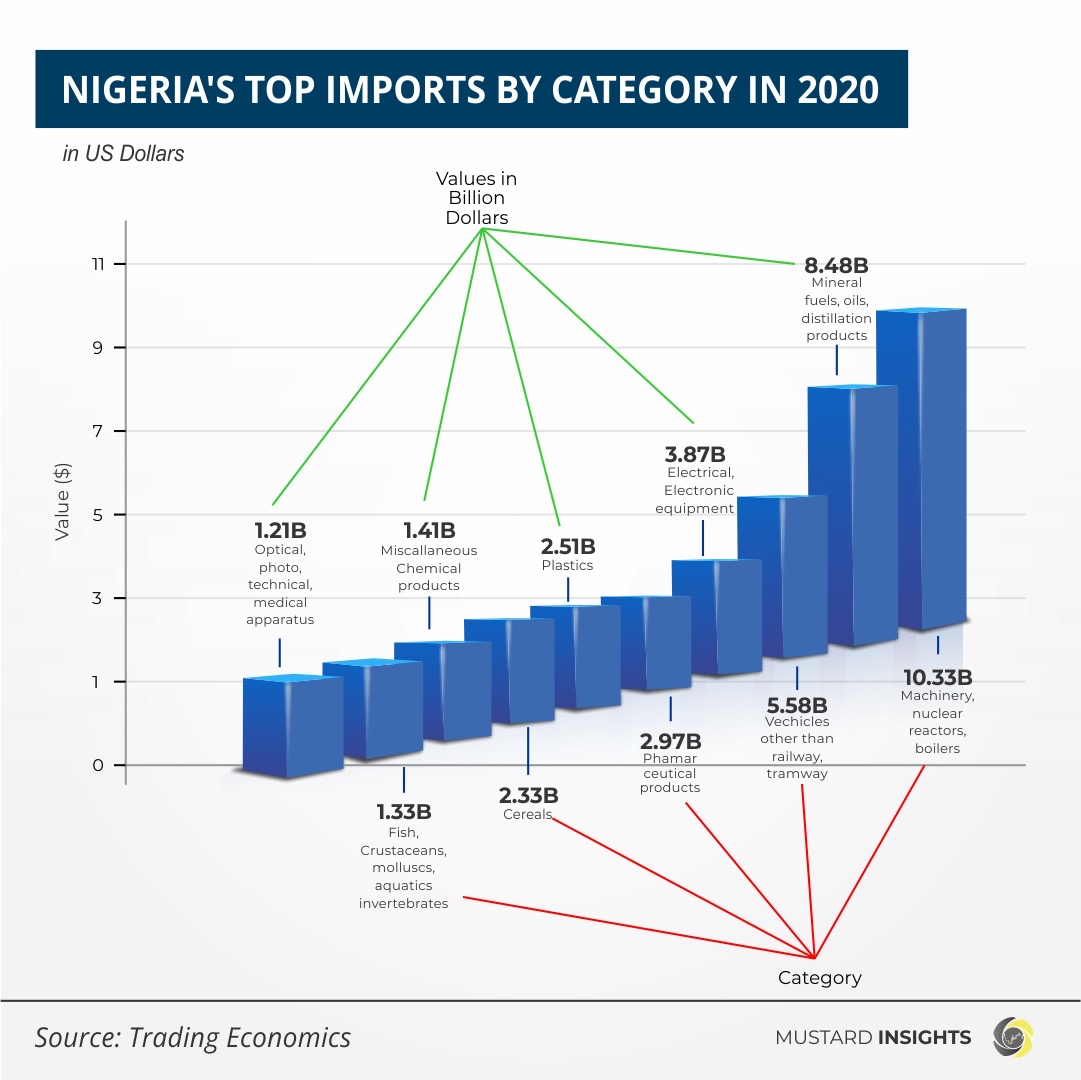Nigeria’s continued dependence proves worrisome as total import expenditure reaches 55.4 billion USD in 2020; spends almost 10 billion NGN importing mineral fuels and lubricant. Nigeria imported 625.01 billion USD worth of goods into the country between 2010 and 2020.
Nigeria is popular as a consumer-focused and import-dependent country, a “dumping ground” for many industrial consumables from different countries. Endeavors to change this narrative have proven futile. Despite having the largest population in Africa operating, Nigeria produces merely a fraction of what it uses, while it imports the rest to fill the gap created.
The country has a comparative low export volumes of various commodities and heavily depends on the exportation of crude oil, which accounts for about 80% of its GDP.
Breakdown & Key Metrics
According to data from Trading Economics, Nigeria’s top imports totaled 40.02 billion USD and spread across different categories of commodities. The category with the highest imports is Industrial equipment (Machinery, Nuclear reactors, Boilers) valued at 10.33 billion USD.
The second most imported category of commodities that made their way into Nigeria are mineral fuels, oils and distillation products valued at 8.48 billion USD followed by commodities categorized as tramway and non-railway vehicles, in third, valued at 5.58 billion USD.
Other categories of Nigeria’s top imports are Sea foods (fish, crustaceans, molluscs, aquatic invertebrates) valued at 1.33 billion USD, Miscellaneous Chemical products valued at 1.42 billion USD, Cereals valued at 2.33 billion USD. Plastics and Pharmaceutical products also feature on the list of Nigeria’s top imports and are worth 2.51 billion USD and 2.97 billion USD, respectively. In the same year, Nigeria imported 3.78 billion USD worth of Electrical and Electronic equipment.
The category of commodities with the lowest import values of the top 10 categories are optical, photo, medical apparatus and technical items, with a value of 1.21 billion USD.
Other insights
The Central Bank of Nigeria (CBN) has drawn a correlation between Nigeria’s import dependency and the declining value of the Nigerian currency.
According to the CBN, Nigeria’s capital inflows plummeted to a four-year low of 9.66 billion USD in 2020, only to drop further to 6.7 billion USD in 2021. Nigeria’s international trade balance for 2021 has dropped to a deficit of 1.94 trillion NGN, the largest on record.
Nigeria’s exports climbed by 51% to 18.91 trillion NGN in 2021, up from 12.52 trillion NGN the year before. The increase in profits from exportation, however, was not enough to offset the 64.1% increase in import bills, which totaled 20.84 trillion NGN.
The outflow of foreign exchange totaling 5.26 billion USD deficit balance of payment made in 2021 is piling even more pressure on the local currency. Hence, this has caused the use of the external reserve.
In 2021, the CBN reported it has provided the sum of 864 billion NGN to 4.1 million farmers who are cultivating 5.02 million hectares of land under its Anchor Borrowers’ Program (ABP).
Takeaway
The importation of all manners of foreign products into Nigeria without hindrance and necessary checks is a barrier to the economic growth and development of the country. Over the past four years, the Nigerian government has clamped down on some imported goods such as rice, beef, and second-hand clothing even though 80% of Nigerians buy them. These are deliberate policies to protect infant industries and improve the country’s balance of trade.
Thoughts?
We won't share your email address. All fields are required.

